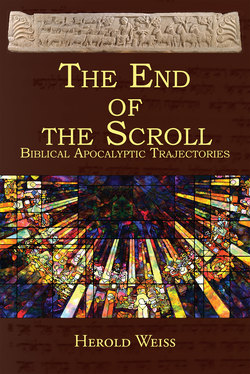Читать книгу The End of the Scroll - Herold Weiss - Страница 2
На сайте Литреса книга снята с продажи.
ОглавлениеPraise for The End of the Scroll
Herold Weiss’ The End of the Scroll offers non-specialists a highly readable and impeccably researched study of biblical apocalyptic literature. Drawing on a lifetime of scholarly immersion in biblical literature, Weiss traces the history of apocalyptic thought, its rise in ancient Israel and its endurance over centuries among Jews and Christians of antiquity. Biblical writers recycled the counsel of their predecessors by refashioning the old to meet the new in response to tragic human conditions in their own time. Weiss’s account of these ancient reinterpretations moves through the biblical books from Israelite prophets to the Book of Revelation, rewarding the reader again and again with illuminating insights. He also provides a very helpful analysis of the use of biblical apocalyptic texts by subsequent generations, from scholars in Renaissance Rome to twenty-first century evangelical interpretations of the signs of the times. In almost every case, these later interpreters have misunderstood the intent of biblical apocalyptic thinking by assuming that its purpose was to predict the future. The ancient apocalypticists, Weiss argues, were not invested in predictions. They described their hopes for God’s future in order to encourage the faithful in the present, not to foster obsession with timetables. Weiss invites his readers to recover this original intent of the biblical apocalyptic imagination by using their own imaginations to encourage faithful living in the present. Any student of biblical literature who is interested in the historical development of apocalyptic and its interpretation will be richly rewarded by this book.
Charles H. Cosgrove, Ph.D.
Professor of Early Christian Literature
Garrett Evangelical Theological Seminary
For the pastor who wants to bring clarity to the confusion that accompanies the hysteria promoted by those who act as harbingers of the “Last Days,” this book will come as a welcome relief. Dr. Weiss puts apocalyptic in its historical context, not as a map to the future, but as a call to faithfulness for its audience during their times of distress. Weiss also traces the many failures of attempting to bring the apocalyptic messages into the present. In the process, the books of the Old and New Testaments will no longer be useful for “end of days” fodder. Apocalyptic then becomes a friend of today by encouraging faithful living now after the manner of the sages of old.
Rev. Steven F. Kindle, Faith on the Edge Podcast
Retired United Church of Christ Pastor
Herold Weiss is a steady and insightful guide into the sometimes puzzling world of Jewish and Christian apocalyptic literature. He is remarkable in his ability to make complex ideas accessible, to explain how texts work, and to show both how and why the tradition develops and changes over time. Given the importance of apocalyptic thinking in the development of the Christian tradition and its enduring influence, this book ought to be required reading.
Rubén R. Dupertuis, Ph.D.
Associate Professor of Religion and Chair
Department of Religion, Trinity University
Herold Weiss’ End of the Scroll is a tour de force of biblical and extra-canonical scholarship on the apocalypse. I found Weiss’ text lively and captivating in its depth and relevance to our current national and global crises. This book is solid scholarship and yet accessible to educated laypersons as well as to pastors and academics. While primarily focusing on scripture, Weiss also connects the apocalyptic literature of scripture with the current popular interest in apocalyptic and end times theology. Weiss reminds us that apocalyptic imagery involves much more than charting the end of the world, but summons persons to live faithfully amid the challenges of their time. Apocalyptic inspires us to trust God’s future in times of trial, committed to embodying God’s vision and enduring life’s crises with courage and integrity.
Bruce G. Epperly, Ph.D.
Pastor, Lecturer, and author of Finding God in Suffering: A Journey with Job and many other books
Short of providing an introduction to the New Testament, Weiss draws attention to it from an apocalyptic perspective, pointing out the dynamics of a timeless appeal. Elegantly written and replete with original insights, each chapter constitutes a gateway into the next, underscoring the enduring relevance of the biblical books linked by a common theme. Readers will soon discover that the end of the scroll is but its beginning, or that of another inspired by it.
Abraham Terian, Th.D.
Emeritus Professor of Armenian Patristics
St. Nersess Armenian Seminary
